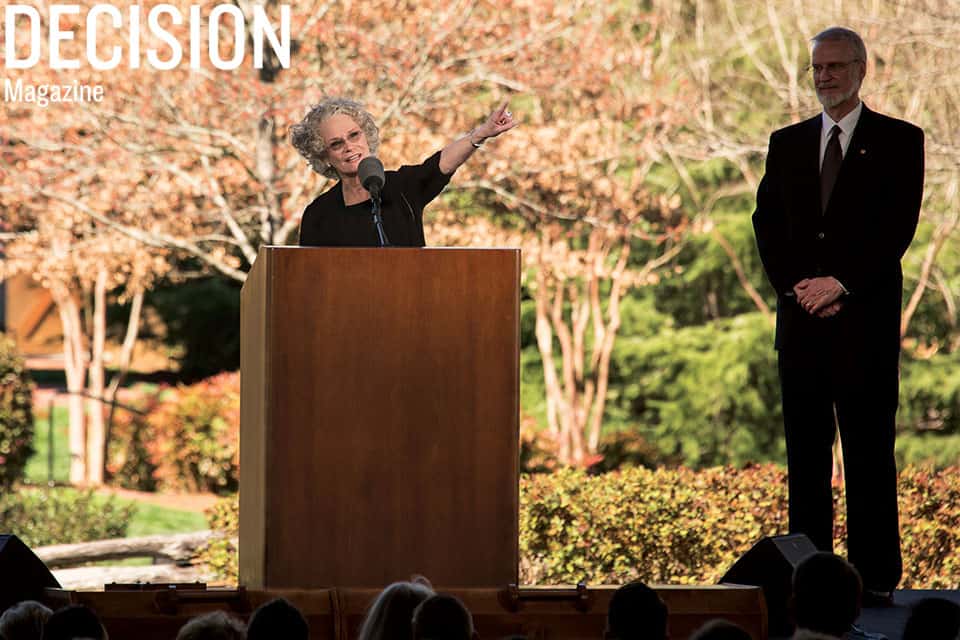
Subscribe to Decision
Get your own subscription, or renewal, or bless someone by giving Decision Magazine as a gift.
SUBSCRIBE NOW
I have learned in the weeks since my father’s death that everybody has a Billy Graham story. But I have my own Billy Graham story. Some of you may have heard it many times, but it bears repeating because it speaks to the essence of who my father was and is.
After 21 years, my marriage ended in divorce. I was devastated. I floundered. My husband had betrayed me at the deepest levels. I understood I had Biblical grounds for divorce, but I did not want to be divorced. I did not want to hurt or displease God in any way.
My family thought it would be a good idea for me to move away from the Shenandoah Valley, to get a fresh start somewhere else. So, I decided to live in Florida near my older sister Gigi and her family and near a good church. The pastor of that church introduced me to a handsome widower, and we began to date fast and furiously. My children didn’t like him, but I thought, They’re almost grown. And they can’t tell me what to do. I knew what was best for my life.
My mother called me from Seattle. My father called me from Tokyo. They said, “Honey, why don’t you slow down? Let us get to know this man.”
They had never been a single parent. They had never been divorced. What did they know? So, being stubborn, willful and sinful, I married this man on New Year’s Eve, and within 24 hours I knew I’d made a terrible mistake.
After five weeks, I fled. I was afraid of him. What was I going to do? I wanted to go talk to my mother and my father.
On my way to Montreat, I stopped and picked up my daughter Windsor from boarding school. I felt wrecked. I was coming home with my life in pieces. Shame weighed me down … I dreaded having to meet my parents’ gaze—I didn’t think I could handle what their eyes might communicate. I wanted to run and hide. But I could not. I had nowhere else to go. I could not undo my mistake. I knew I had to face it. I felt unworthy to go home, but I needed my parents.
I look back now, overwhelmed by God’s tenderness and timing, for it was at this, my darkest hour, that God stepped in with one of His most powerful metaphors in my life.
It was a two-day drive to Montreat. Questions whirled in my mind. What was I going to say to Daddy? What was I going to say to Mother? What was I going to say to my children? I’d been such a failure. What were they going to say to me? “We’re tired of fooling with you. We told you not to do it. You’ve embarrassed us.”
Many of you know that we live on the side of a mountain. And as I wound myself up the mountain, I rounded the last bend in my father’s driveway, and my father was standing there waiting for me.
My father, who had every reason to rebuke, wrapped his strong arms around me, pulled me into a warm embrace, and greeted me with these simple words: “Welcome home.”
There was no shame. There was no blame. There was no condemnation. Just unconditional love.
My father’s embrace at that moment was one of the most profound gestures of acceptance I have ever experienced. To be utterly broken and still accepted. To feel ugly and yet be loved. To feel like an outcast and still be welcomed. I marveled at the contrast between my heart, full of shame and regret, and my father’s, so full of love.
I must have felt many things at once in his arms: shock, relief, gratitude, safety, disbelief. One thing I most definitely felt was shattered. And through his embrace, my father let me know I had permission to feel that way. He was not condemning me. No defense or explanation was required.
My father was not God. But he showed me what God is like that day. His one act of grace changed my life and informed who I am. I am so grateful God accepts me as I am—hurting, wounded, broken. I am glad He chooses me to be part of His family, regardless of my past mistakes and sins. He wants me. He cares about me. His arms are open to me at all times.
Even when I am in the ruins, God stands watching the road, eager for me to come to Him. God doesn’t stop at ruin, it’s where He begins. And brokenness is a qualification for service to Him.
God does not hold in His hand a list of my failures. He is not waiting to judge me. He is waiting to be with me. He is waiting to embrace me and welcome me home.
And that invitation is open for you. ©2018 Ruth Graham
Don’t wait. Respond now to God’s calling.
>> Read more from Decision Magazine
Give To Where Most Needed
